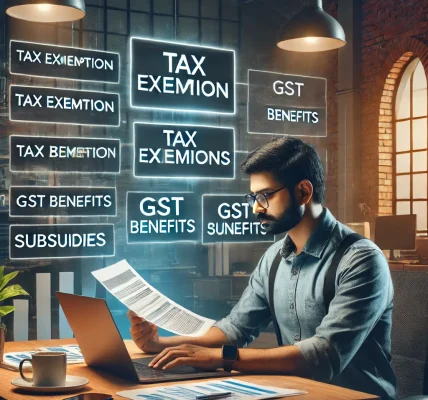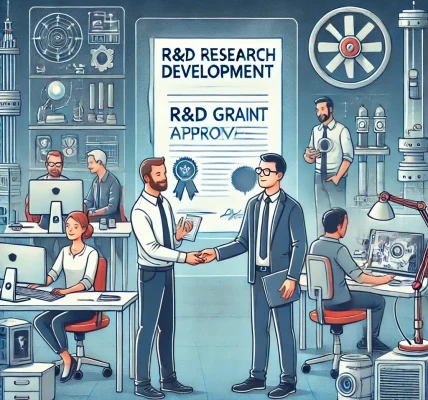Introduction
Taxation is a crucial aspect of running a business, and for startups and MSMEs (Micro, Small, and Medium Enterprises), tax benefits can provide much-needed financial relief. The Government of India has introduced several tax exemptions, rebates, and subsidies under different schemes to support entrepreneurship and business growth.
This blog explores various government schemes offering tax benefits to startups and MSMEs in 2025, their eligibility criteria, advantages, and the application process.
1. Startup India Tax Exemptions
Overview
The Startup India initiative was launched to foster entrepreneurship by offering various benefits, including tax exemptions under Section 80-IAC of the Income Tax Act.
Eligibility
- Must be recognized as a startup by DPIIT (Department for Promotion of Industry and Internal Trade)
- Incorporated as a Private Limited Company, LLP, or Partnership Firm
- Annual turnover should not exceed ₹100 crore in any financial year
- Must be working on innovation, development, or improvement of products/services
- Should not be formed by splitting up an existing business
Tax Benefits
- 100% tax exemption for 3 consecutive years out of the first 10 years
- Exemption from angel tax (Section 56(2)(viib))
- Tax exemption on long-term capital gains (Section 54EE)
How to Apply
- Register on the Startup India portal
- Apply for DPIIT recognition and tax benefits via the Income Tax Department’s online portal
- Approval granted after verification by an inter-ministerial board
2. Presumptive Taxation Scheme for MSMEs (Section 44AD, 44ADA, and 44AE)
Overview
The Presumptive Taxation Scheme simplifies tax compliance for MSMEs by reducing the burden of maintaining extensive books of accounts.
Eligibility
- Applicable to small businesses, professionals, and transporters
- Section 44AD: Businesses with annual turnover up to ₹2 crore
- Section 44ADA: Professionals (Doctors, Lawyers, Engineers, etc.) with income up to ₹50 lakh
- Section 44AE: Transport businesses owning up to 10 vehicles
Tax Benefits
- MSMEs can declare 8% of turnover as income and pay tax only on that amount
- For digital transactions, the income can be declared at 6% instead of 8%
- No need to maintain books of accounts or audit reports
How to Apply
- Opt for the presumptive taxation scheme while filing ITR-4 (for businesses) or ITR-3 (for professionals)
- Maintain only basic records of transactions
3. GST Benefits for Startups & MSMEs
Overview
The Goods and Services Tax (GST) regime provides several benefits to startups and MSMEs to ease tax compliance.
Eligibility
- Businesses with annual turnover up to ₹1.5 crore can opt for the Composition Scheme
- MSMEs involved in manufacturing, trading, and services
- E-commerce sellers are eligible for certain exemptions
Tax Benefits
- Lower tax rates (1% for traders, 5% for restaurants, 6% for service providers) under the GST Composition Scheme
- Quarterly return filing for MSMEs with turnover up to ₹5 crore (instead of monthly returns)
- Exemption from GST registration for businesses with turnover below ₹40 lakh (₹20 lakh for services)
How to Apply
- Register on the GST portal (www.gst.gov.in)
- Opt for the Composition Scheme while filing GST returns
4. Tax Holiday for New Manufacturing MSMEs (Section 115BAB)
Overview
To encourage new manufacturing businesses, the government offers a concessional tax rate under Section 115BAB.
Eligibility
- New manufacturing units incorporated after October 1, 2019 and before March 31, 2024
- Must not be formed by splitting an existing business
- Should commence manufacturing operations before March 31, 2024
Tax Benefits
- Reduced corporate tax rate of 15% (plus surcharge and cess)
- No MAT (Minimum Alternate Tax) applicability
How to Apply
- Opt for Section 115BAB while filing the Income Tax Return (ITR)
- Maintain proper documentation of business incorporation and manufacturing activities
5. Capital Gains Tax Exemption for Startups (Section 54GB)
Overview
Under Section 54GB, startups can claim an exemption on long-term capital gains if the proceeds are invested in a new business.
Eligibility
- Individuals or HUFs selling residential property and investing in an eligible startup
- Startup must be recognized under Startup India
- Funds must be used to purchase new assets like plant and machinery
Tax Benefits
- Exemption from capital gains tax if investment is made in an eligible startup
- Encourages reinvestment of gains into business expansion
How to Apply
- Claim exemption under Section 54GB while filing the Income Tax Return (ITR)
- Ensure investment is made within 6 months of the property sale
6. Export Promotion & SEZ Tax Benefits
Overview
Startups and MSMEs engaged in export activities can avail tax benefits under Export Promotion schemes and Special Economic Zones (SEZs).
Eligibility
- Businesses registered under Export Promotion Capital Goods (EPCG) scheme
- Units operating in Special Economic Zones (SEZs)
Tax Benefits
- 100% income tax exemption for SEZ units for the first 5 years
- 50% tax exemption for the next 5 years
- Exemptions on import duties and GST for exporters
How to Apply
- Register under SEZ Act through the Ministry of Commerce
- Obtain an Import Export Code (IEC) from the DGFT portal
Conclusion
Government schemes offering tax benefits play a vital role in reducing the financial burden on startups and MSMEs. Whether it’s income tax exemptions, GST relief, or capital gains benefits, these incentives help businesses grow while ensuring compliance with regulations.
Before applying for any tax benefit, it is advisable to consult a professional tax expert or visit official government portals to ensure eligibility and proper documentation.
By leveraging these tax benefits, startups and MSMEs can optimize their financial resources and focus on innovation and expansion, contributing to India’s growing economy.




